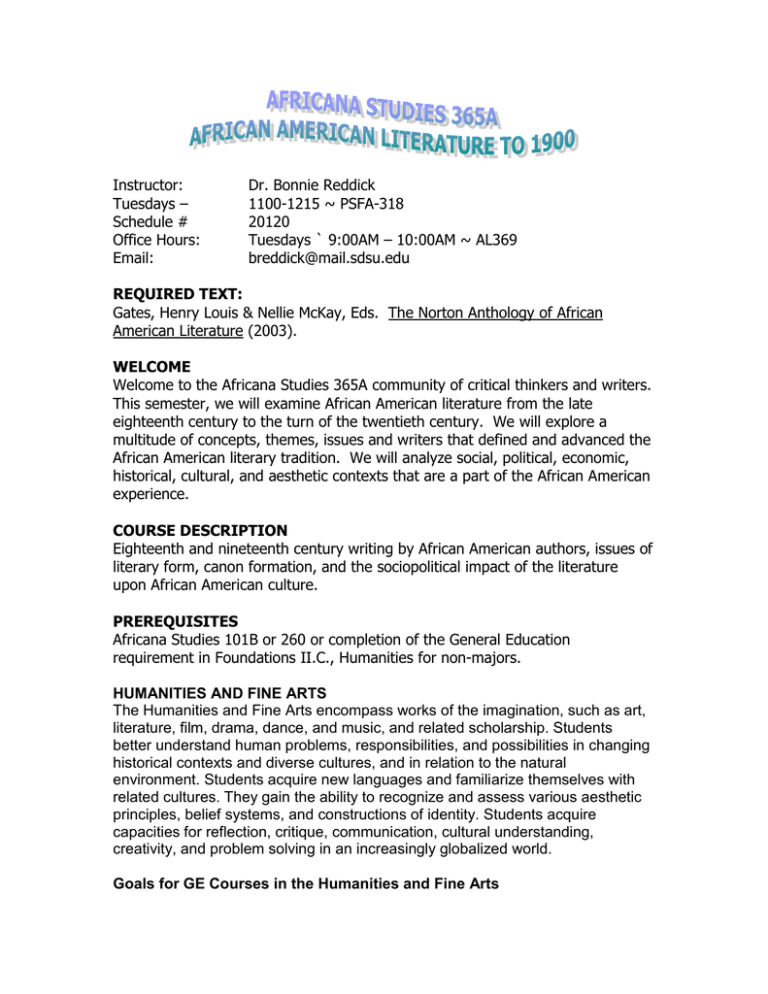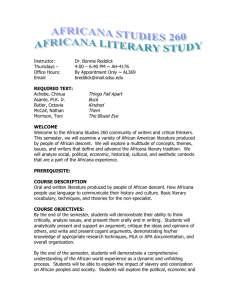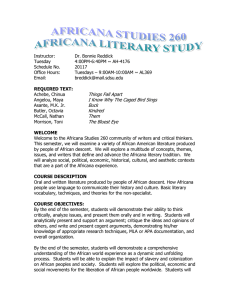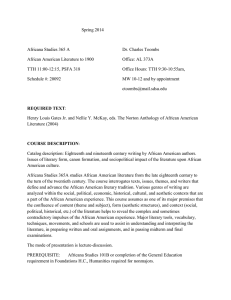Instructor: Dr. Bonnie Reddick Tuesdays –
advertisement

Instructor: Tuesdays – Schedule # Office Hours: Email: Dr. Bonnie Reddick 1100-1215 ~ PSFA-318 20120 Tuesdays ` 9:00AM – 10:00AM ~ AL369 breddick@mail.sdsu.edu REQUIRED TEXT: Gates, Henry Louis & Nellie McKay, Eds. The Norton Anthology of African American Literature (2003). WELCOME Welcome to the Africana Studies 365A community of critical thinkers and writers. This semester, we will examine African American literature from the late eighteenth century to the turn of the twentieth century. We will explore a multitude of concepts, themes, issues and writers that defined and advanced the African American literary tradition. We will analyze social, political, economic, historical, cultural, and aesthetic contexts that are a part of the African American experience. COURSE DESCRIPTION Eighteenth and nineteenth century writing by African American authors, issues of literary form, canon formation, and the sociopolitical impact of the literature upon African American culture. PREREQUISITES Africana Studies 101B or 260 or completion of the General Education requirement in Foundations II.C., Humanities for non-majors. HUMANITIES AND FINE ARTS The Humanities and Fine Arts encompass works of the imagination, such as art, literature, film, drama, dance, and music, and related scholarship. Students better understand human problems, responsibilities, and possibilities in changing historical contexts and diverse cultures, and in relation to the natural environment. Students acquire new languages and familiarize themselves with related cultures. They gain the ability to recognize and assess various aesthetic principles, belief systems, and constructions of identity. Students acquire capacities for reflection, critique, communication, cultural understanding, creativity, and problem solving in an increasingly globalized world. Goals for GE Courses in the Humanities and Fine Arts • Goal 1: Analyze written, visual, or performed texts in the humanities and fine arts with sensitivity to their diverse cultural contexts and historical moments. • Goal 2: Develop a familiarity with various aesthetic and other value systems and the ways they are communicated across time and cultures. • Goal 3: Argue from multiple perspectives about issues in the humanities that have personal and global relevance. • Goal 4: Demonstrate the ability to approach complex problems and ask complex questions drawing upon knowledge of the humanities. Department Goals and Objectives: • Goal 2: Demonstrate comprehensive knowledge and understanding of the A frican world experience as a dynamic and unfolding process Objectives: (1) Explain the impact of slavery and colonization on African peoples and society, (2) Explain the political, economic and social movements for liberation of African people in America before 1900 and worldwide, (3) Identify and explain the dislocation and relocation of African people throughout the world, (4) argue from multiple perspectives about issues in African American literature before 1900 that have personal and global relevance. General Education Humanities Goal 3 and 4 • Goal 3: Demonstrate a thorough knowledge of Africana culture and world-view Objectives: (1) Explain and assess the major principles and values of Africana world-view and culture as demonstrated in the literature and its contexts, (2) Explain the major moral, philosophical, aesthetic and ethical elements of Africana world-view and culture in the literature and its contexts, (3) Explain the role of Africana world-view in society before 1900 and in contemporary society. General Education Humanities Goal 2 • Goal 4: Demonstrate an ability to think critically, analyze issues and present them orally and in writing. General Education Humanities Goal 1 Objectives: (1) Analytically present and support an argument, (2) Critique the ideas and opinions of others, (3) Write and present cohesive arguments demonstrating knowledge of research techniques, documentation, organization, and the mechanics of writing on relevant topics or subjects in African American literature before 1900 Student Learning Outcomes: 1. Explicate primary literary texts, in writing and orally 2. Use secondary resources to assist the advancement of a thesis 3. Analyze the significance of a literary work by paying attention to its content, form, and context 4. Elucidate the significance of an Africana literary work to self and contemporary society 5. Compare literatures of diverse cultures within society 6. Use literary terms and vocabulary with expertise and sophistication 7. Defend interpretations and positions by generously using details in the primary texts and the contexts of the literature 8. Assess and analyze acts of resistance to white rule and/or authority on themes, style, and characters/personas/narrators in the literature 9. Describe, identify, analyze, assess, and compare literary strategies used by Africana authors to include authentic representations of Africana culture, history, philosophy, world-view, and perspective GRADING: Quizzes Midterm Final Teaching Experience Black National Anthem Essays Attendance/Participation TOTAL 10% 15% 20% 15% 10% 20% 10% 100% A (95-100); A- (90-94); B+ (86-89); B (83-85); B- (80-82); C+ (76-79); C (73-75); C- (70-72); D+ (66-69); D (63-65); D- (60-62); F (0-59) READING Reading is an important part of developing strong writing and critical thinking skills. Completion of all readings will be necessary for quizzes, homework, essays, and class discussions. WRITING In addition to quizzes and writing assignments, essays will be required. Additional information will be given as the semester progresses. Students agree that by taking this course all required papers will be subject to submission for textual similarity review to Turnitin.com for the detection of plagiarism. All submitted papers will be included as source documents in the Turnitin.com reference database solely for the purpose of detecting plagiarism of such papers. You may submit your papers in such a way that no identifying information about you is included. Another option is that you may request, in writing, that your papers not be submitted to Turnitin.com. However, if you choose this option you will be required to provide documentation to substantiate that the papers are your original work and do not include any plagiarized material. ESSAYS All formal essays must be typed (12 point font), double-spaced, with one-inch margins on all sides. Submit your essays electronically through Backboard’s turnitin.com Assignments tool by 4:00 PM on the due date detailed on the course calendar. More specific details on this assignment will be provided. QUIZZES/FREE WRITES There may be a quiz, based on the assigned reading for that day, at the beginning of each class session. You will be given ten (10) minutes to take the quiz. Quizzes may consist of multiple choice, true/false, short fill-in, or short essay responses. Quizzes cannot be made up. MIDTERM A midterm examination, consisting of true/false, multiple choice, short fill-in and essay questions, will be given approximately six (6) weeks after the beginning of the semester. The midterm will assess the knowledge you’ve acquired from the beginning of the semester to the mid-point of the semester. FINAL A final examination, consisting of true/false, multiple choice, short fill in and essay questions will be given. The final will assess the knowledge you’ve acquired from the Midterm to the end of the semester. TEACHING EXPERIENCE You will be assigned a reading the second week of class. You are responsible for teaching an aspect of the assigned reading. You must use some type of visual aid that best represents what you’re teaching. If you use power point, you cannot exceed five slides. Your presentation cannot exceed 10 minutes. You will be penalized if you do not have a visual aid; you use power point and exceed five slides, or you exceed the time limitation. Whatever you teach should be designed to illicit discussion from your cohorts. You cannot offer incentives, like candy, to encourage cohort participation. Also, you must construct 2-3 questions designed to assess the aspect of the reading you’re teaching, and email it to me the night before your teaching experience. BLACK NATIONAL ANTHEM Each student will be responsible for memorizing and being able to write, on demand, the Black National Anthem. You will have a quiz on each stanza and then the Anthem in its entirety. By the end of the semester, you will write it VERBATIM, and more importantly, you will be able to articulate a cogent analysis of it. This examination is Pass/Fail. If you cannot write it VERBATIM, you will receive 0 points. The Anthem can be found on page 793. HOMEWORK Everyone must successfully complete the plagiarism tutorial. This assignment counts as a Quiz. ATTENDANCE/PARTICIPATION Active participation in class discussions and activities is an essential part of this class. You can do your part by coming to class on time, remaining alert, and being willing to ask questions and share ideas. You should also keep in mind that participating in an inappropriate manner or refusing to participate in class activities will considerably lower your course grade. Many students refrain from commenting during class discussions out of fear that they will give the wrong answer or say something embarrassing. I encourage each of you to risk sharing opinions that you are not entirely sure of. Since none of the readings can be said to have a “perfect” interpretation, your comments can only assist the class in its primary goal of critically exploring the ideas presented in the various texts we will read. Attendance is crucial to your success in this class. I record attendance every day. If you arrive after I have taken attendance, it is your responsibility to come up to me at the end of class to change your absence to a tardy. No absence will be changed after the day you come late. TARDINESS/LEAVING EARLY Unless you have made prior arrangements with me, you are expected to be in class on time and remain until class is over. Unexcused incidents of leaving early will be counted as an absence for that day. Arranging with me to arrive late or leave early should be the exception not the rule. If you have a commitment that requires you to arrive late or leave early on a regular basis, you should take this class at another time. Note: Excessive tardies will significantly reduce your course grade. CHEATING/PLAGARISIM “Cheating shall be defined as the act of obtaining or attempting to obtain credit for academic work by the use of dishonest, deceptive, or fraudulent means. Examples of cheating include, but are not limited to (a) copying, in part or in whole, from another’s test or other examination; (b) discussing answers or ideas relating to the answers on a test or other examination without the permission of the instructor; (c) obtaining copies of a test, an examination, or other course material without the permission of the instructor; (d) using notes, cheat sheets, or other devices considered inappropriate under the prescribed testing condition; (e) collaborating with another or others in work to be presented without the permission of the instructor; (f) falsifying records, laboratory work, or other course data; (g) submitting work previously presented in another course, if contrary to the rules of the course; (h) altering or interfering with the grading procedures; (i) plagiarizing, as defined; and (j) knowingly and intentionally assisting another student in any of the above. 2.2 Plagiarism shall be defined as the act of incorporating ideas, words, or specific substance of another, whether purchased, borrowed, or otherwise obtained, and submitting same to the University as one’s own work to fulfill academic requirements without giving credit to the appropriate source. Plagiarism shall include but not be limited to (a) submitting work, either in part or in whole, completed by another; (b) omitting footnotes for ideas, statements, facts, or conclusions that belong to another; (c) omitting quotation marks when quoting directly from another, whether it be a paragraph, sentence, or part thereof; (d) close and lengthy paraphrasing of the writings of another; (e) submitting another person’s artistic works, such as musical compositions, photographs, paintings, drawings, or sculptures; and (f) submitting as one’s own work papers purchased from research companies. Academic and Punitive Sanctions: Cheating and plagiarism in connection with the academic program at The University may warrant two separate and distinct courses of disciplinary action that may be applied concurrently in response to a violation of this policy: (a) academic sanctions, such as grade modifications; and (b) punitive sanctions, such as probation, suspension, or expulsion. Academic sanctions are concerned with the student’s grades and are the responsibility of the instructor involved. Punitive sanctions are concerned with the student’s records and status on campus and shall be the responsibility of the University President or designated representative. The Coordinator of Judiciary Procedures shall be the President’s representative in matters of student discipline.” http:/senate.sdsu.edu/policy/pfacademics.html ACCOMMODATION OF DISABILITY Students who need accommodation of their disabilities should contact me privately, to discuss specific accommodations for which they have received authorization. If you need accommodation due to a disability, but have not registered with Student Disability Services at 619-594-6473 (Calpulli Center, Suite 3101), please do so before making an appointment to see me. OTHER COURSE POLICIES 1. Treat other students and me with respect. Students are expected to refrain from behavior that interferes with the learning of other students. 2. Come to class prepared. If you are absent, you are still responsible for completing the readings and any homework assigned during your absence. 3. Complete all homework on time. Readings and any other assignments are to be completed prior to class. Refer to the course calendar for due dates. Additional assignments are due as directed, when assigned. Late assignments will not be accepted. 4. Except during group work, only one person at a time may address the class. You are expected to listen attentively and refrain from conversation while another person is speaking. 5. No cell phones or other electronic equipment may be operated in class. Do not surf the Internet or text message a friend. You are welcome to use your computers to record notes, but please do not surf the Internet. If I observe you checking your phone, texting, surfing the Internet, completing other classwork during my class, the first time, you’ll receive a warning. Subsequent violations, you will be asked to leave the classroom, and I will record an absence for that day. 6. Please DO NOT email any assigned work to me. 7. I frequently post updates and information on Blackboard.



